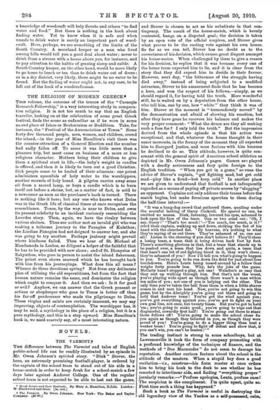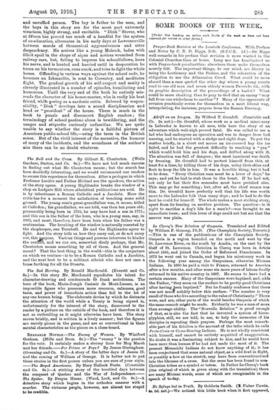NOVELS.
THE VARMINT.t THE difference between The Varmint and tales of English public-school life can be readily illustrated by an episode in Mr. Owen Johnson's spirited story. "Dink" Stover, the hero, an extremely promising football-player, is ordered by the captain of the school team to stand out of his side in a house-match in order to keep fresh for a school-match a few days later against Andover College. One of the regular school team is not expected to be able to last out the game,
• Greek Saints and their Festivals. By Mary A. Hamilton, D.Litt. London : W. Blackwood and Sone. [5s. net.]
•
t The Varmint. By Owen Johnson. New York : The Baker and Taylor Company. C.110.]
and Stover is chosen to act as his substitute in that con- tingency. The result of the house-match, which is keenly contested, hangs on a disputed goal; the decision is taken by an open vote of the official umpires, and Stover gives what proves to be the casting vote against his own house.
So far as we can tell, Stover has no doubt as to the correctness of his decision, which causes great disgust amongst his house-mates. When challenged by them to give a reason for his decision, he replies that it was because every one of the house team expected him to lie, and it is clear from the story that they did expect him to decide in their favour. However, next day, "the bitterness of the struggle having died away," instead of being subjected to a modified ostracism, Stover to his amazement finds that be has become a hero, and won the respect of his fellows,—simply, as we should regard it, for having told the truth. More wonderful still, he is waited on by a deputation from the other house, who tell him, one by one, how " white" they think it was of him. Stover at the moment is " tremendously moved" by the demonstration and afraid of showing his emotion, but after they have gone he recovers his balance and makes the very proper comment : " What the deuce are they all making such a fuss for P I only told the truth." But the impression derived from the whole episode is that his action was exceptional, and that, whatever the house thought in their saner moments, in the frenzy of the moment they all expected him to disregard justice, and were furious with him because he declined to do so. This attitude, however, is quite con- sonant with the general spirit of American school athletics as depicted in Mr. Owen Johnson's pages. Games ara played with a deadly seriousness and fury quite foreign to the English tradition. " When you get in a game," so runs the advice of Stover's captain, "get fighting mad, but get cold mad—play like a fiend—bnt keep cold." In another place we are given to understand that football is not infrequently regarded as a means of paying off private scores by "slugging" an opponent. Captains not only address their teams before the
match begins, but make ferocious speeches to them during the half-time interval:— "It was a hang-dog crowd that gathered there, quailing under the scornful lashing of Garry Cockrell. He spared no one, he omitted no names. Dink, listening, lowered his eyes, ashamed to
look upon the face of the team. One or two cried out : I say, Garry !" That's too much ! Too much, too much, is it ? '
cried their captain, walking up and down, striking the flat of his hand with the clenched fist. By heavens, it's nothing to what they're saying of us out there. They're ashamed of us, one and all! Listen to the cheering if you don't believe it I They'll cheer a losing team, a team that is being driven back foot by foot There's something glorious in that, but a team that stands up to be pushed over, a team that lies down and quits, a team that that hasn't one bit of red fighting blood in it, they won't cheer ; they're ashamed of you! Now I'll tell you what's going to happen to you. You're going to be run down the field for just about four touchdowns. Here's Lentz being tossed around by a fellow that weighs forty pounds less. Why, he's the joke of the game. McCarty hasn't stopped a play, not one! Waladoo's so easy that they rest up walking through him. But that's not the worst, you're playing wide apart as though there wasn't a man within ten miles of you ; not one of you is helping out the other. The only time you've taken the ball from them is when a little shaver comes in and uses his head. Now, you're not going to win this game, but by the Almighty you're going out there and going to hold that Andover team ! You've got the wind against you; you've got everything against you; you've got to fight on your own goal line, not once, but twenty times. But you've got to hold 'em ; you're going to make good ; you're going to wipe out that disgraceful, cowardly first half ! You're going out there to stand those fellows off ! YOu're going to make the school cheer foi you again as though they believed in yon, as though they wert proud of you! You're going to do a bigger thing than beat weaker team ! You're going to fight off defeat and show that, ii you can't win, you can't be beaten !' " The trading instinct is strong in some schoolboys, but at Lawrenceville it took the form of company promoting with a profound knowledge of the technique of finance, and the methods of "Doe Macnooder " do not seem to damage his reputation. Another curious feature about the school is the attitude of the masters. When a stupid boy does a good recitation—i.e., construe—his form master at once orders him to bring his book to the desk to see whether he has resorted to interlinear aids, and finding "everything proper" jocularly remarks :—" Profuse apologies, Lentz, profuse ones!
The suspicion. is the compliment. I'm quite upset, quite so. First time suck a thing has happened."
Such a book as The Varmint is useful in destroying the old legendary view of the Yankee as a self-possessed, calm,
and unruffled person. The boy is father to the man, and the boys in this story are for the most part extremely vivacious, highly strung, and excitable. " Dink " Stover, who at fifteen has proved too much of a handful for the system of co-education, alternates in his early days at Lawrenceville between moods of thrasonical aggressiveness and utter despondency. He arrives like a young Mohock, laden with illicit spoil in the shape of signs and notices wrenched from railway cars, but, failing to impress his schoolfellows, loses his nerve, and is hunted and harried until in desperation he turns on his tormentors, runs amok, and tries to fight the whole house. Offending in various ways against the school code, he becomes an Ishmaelite, is sent to Coventry, and meditates flight. The gradual growth of his self-respect and sanity is cleverly illustrated in a number of episodes, humiliating and humorous. Until the very end of the book he entirely mis- reads the character of his house-master, who is really his best friend, whilb posing as a sardonic critic. Sobered by respon- sibility, " Dink " develops into a sound disciplinarian and head or " president " of the house. There is much in the book to puzzle and disconcert English readers ; the terminology of school pastime alone is bewildering, and the usages and etiquette curiously unfamiliar. We are quite unable to say whether the story is a faithful picture of American public-school life,—using the term in the British sense. But of the vivid interest of the narrative, the humour of many of the incidents, and the soundness of the author's aim there can be no doubt whatever.







































 Previous page
Previous page